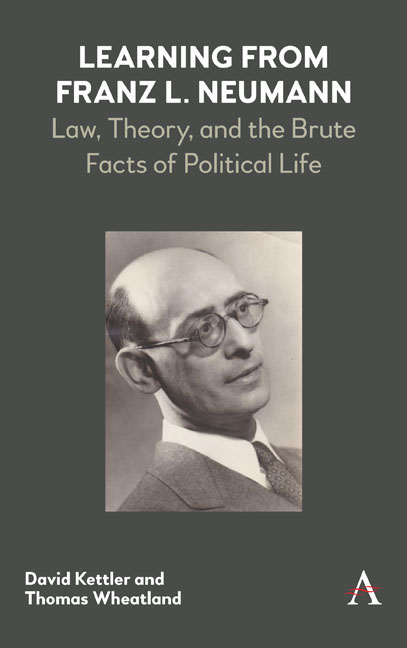Book contents
- Frontmatter
- Contents
- Chapter 1 The Challenge of Franz L. Neumann
- Chapter 2 Social Constitution, Social Power and Responsibility: Neumann and Labor Advocacy
- Chapter 3 Power, Resistance and Constitutions
- Chapter 4 Franz Neumann's Commemoration of Exile
- Chapter 5 After Weimar: The First Exile
- Chapter 6 Neumann's Second Exile: Negotiating the Politics of Research
- Chapter 7 No Happy End: Unprofitable Negotiations
- Chapter 8 Behemoth: Wars Can Be Lost
- Chapter 9 Franz Neumann in Washington: The Political Intellectual at War
- Chapter 10 Franz Neumann in the University: La guerre est finie
- Chapter 11 The Legacy: Four Studies
- Conclusion
- Index
Chapter 6 - Neumann's Second Exile: Negotiating the Politics of Research
Published online by Cambridge University Press: 06 September 2019
- Frontmatter
- Contents
- Chapter 1 The Challenge of Franz L. Neumann
- Chapter 2 Social Constitution, Social Power and Responsibility: Neumann and Labor Advocacy
- Chapter 3 Power, Resistance and Constitutions
- Chapter 4 Franz Neumann's Commemoration of Exile
- Chapter 5 After Weimar: The First Exile
- Chapter 6 Neumann's Second Exile: Negotiating the Politics of Research
- Chapter 7 No Happy End: Unprofitable Negotiations
- Chapter 8 Behemoth: Wars Can Be Lost
- Chapter 9 Franz Neumann in Washington: The Political Intellectual at War
- Chapter 10 Franz Neumann in the University: La guerre est finie
- Chapter 11 The Legacy: Four Studies
- Conclusion
- Index
Summary
Neumann's Contested Place
For most people familiar with Critical Theory, Franz Neumann is typically seen as a minor player in a complex institutional and intellectual drama. Unlike the core members of Max Horkheimer's Institute for Social Research in its New York exile years, Neumann did not engage in philosophical inquiries. In his work as legal and political thinker, he focused on the political implications of philosophical designs he found generally sympathetic, while maintaining some skeptical distance from the foundational work. This pattern was already manifest in his first dissertation, where he expressly addresses the question of relations between philosophical and other levels of inquiry into legal issues. He was also a relative latecomer to the Institute who did not fit comfortably within its intellectual orbit around the Frankfurt School's director, Max Horkheimer— and there is no question that Neumann's experiences and commitments to working- class political movements were out of step with the Frankfurt School's abandonment of the proletariat as the primary agent of revolutionary social change. More broadly, Horkheimer and his most intimate group did not recognize the distinct problems of political theory as bearing philosophical weight. This is not to say, however, as some have assumed, that Neumann's intellectual contributions to the Critical Theory enterprise were not substantial. Rather, it points to the fact that Neumann was underutilized and underappreciated by Horkheimer and his administrative right- hand man, Friedrich Pollock, during the years of Neumann's brief collaborations with them. The working agreements that governed their relations were shallower than they needed to be if they had been able to communicate more reciprocally about the limits of their respective domains. Nevertheless, the interactions, however flawed, were productive for the Institute, especially in the longer term.
The view of Neumann as peripheral to the Institute of Social Research, taken as the home of the “Frankfurt School,” is a reasonable conclusion from Neumann's inability to engage in sustained research on his own distinctive questions under the auspices of the Institute, as his distinctive research projects were not supported.
- Type
- Chapter
- Information
- Learning from Franz L. NeumannLaw, Theory, and the Brute Facts of Political Life, pp. 203 - 230Publisher: Anthem PressPrint publication year: 2019



